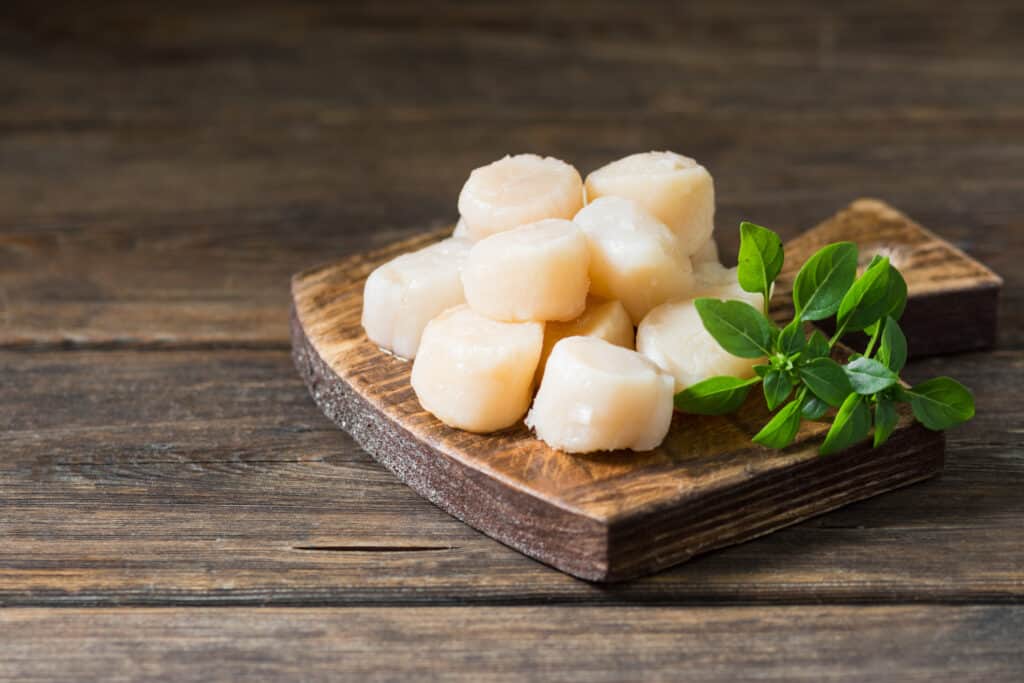Dogs and scallops may not seem like a natural pairing. Still, surprisingly, dogs can safely eat scallops as long as they are properly cooked. Scallops are an excellent source of minerals and protein. They can be a healthy addition to your dog’s diet. However, raw or undercooked scallops can contain harmful bacteria that can make your dog sick. Always cook scallops thoroughly before feeding them to your dog. If you’re looking for a new and exciting way to add variety to your dog’s diet, why not try serving them scallops? In this article, you’ll learn about the benefits and risks of scallops for dogs, so get ready to prepare a fancy feast for your pup!
Benefits of Scallops for Dogs

Dogs can safely eat
scallops as long as they are properly cooked and given only in moderation. Do not add seasoning or butter, and bake them rather than frying them.
©joanna wnuk/Shutterstock.com
Your dog’s body requires the mineral phosphorus for strong bones, teeth, and normal metabolism. Usually, calcium and phosphorus work together to support equilibrium in your dog’s body. It is also excellent for supporting kidney health. You can also find magnesium in scallops necessary for a dog’s mental and physical health.
Protein
A healthy, balanced diet for dogs must include plenty of protein. The body uses protein for various purposes, including developing and maintaining muscles and other bodily tissues. It is required to grow fur, muscle, and new skin cells, among other things. Additionally, it aids in producing essential bodily chemicals, including hormones and enzymes. Like carbs, it provides energy and supports a strong immune system.
Potassium
Potassium is a crucial nutrient for promoting muscle growth. It causes muscle cells to grow quickly, which results in more durable muscles. Additionally, potassium supports muscle contraction and relaxation, enhancing your dog’s motor skills. It facilitates nutrient absorption and digestion in your dog. Potassium improves your dog’s cognitive abilities.
The neural connections from the brain to the rest of the body are significantly strengthened. By working with calcium and phosphorus, potassium supports your dog’s strong bones and teeth. It aids in maintaining the ideal PH levels inside your dog. Your dog can keep more calcium in their bones and blood by controlling acid levels.
Additionally, research indicates that dogs who consistently receive their recommended daily dose of potassium have more substantial bone density. You should not worry about a potassium deficiency in your dog if you provide them with a high-quality diet daily. However, it’s still good to know that scallops contain this mineral.
Risks of feeding Scallops to Dogs

Never feed raw scallops to your dog, as it may cause your friend to develop a nasty virus.
©Lyudmila Zavyalova/Shutterstock.com
Consult your veterinarian before giving your dog scallops because many dog breeds could experience allergic reactions. You can offer your pet scallops in modest amounts to observe reactions. Watch for signs your dog may be experiencing an allergic reaction. These can include excessive scratching or licking, redness or swelling of the skin, and even vomiting or diarrhea.
Call an emergency pet clinic for help. If your dog has previously handled shellfish without issue, they should do well. Still, it’s best to wait until your veterinarian gives you the all-clear. Your dog’s tummy may not be in agreement with this meal if diarrhea and an upset stomach develop.
Raw Scallops for Dogs
Hepatitis A virus exposure is a risk for scallops cultivated in contaminated soil or water. Dogs may contract the virus if they consume uncooked scallops exposed to this viral hepatitis. They could be vulnerable to viruses like Vibrio vulnificus or Vibrio cholerae. These viruses can cause blood poisoning, high fever, and extremely low blood pressure in dogs when it enters their bloodstream.
Meningitis in dogs is uncommon, although some dog breeds are more susceptible to it than others. Typically, bacteria, viruses, and fungi are the culprits behind meningitis. If your dog eats raw scallops that have been exposed to sewage-contaminated water, it could expose them to bacteria and viruses that could make your dog develop meningitis.
How to Feed Them to Your Dog
Fried scallops aren’t an excellent option for your dogs. It can upset their stomach in the short term but can cause pancreatitis over time if frequently fed any fried food. This is due to the high-fat content in fried foods. So how should you feed your dog scallops? Ensure you add no seasonings or butter when preparing it for your dog.
You’ll want to rinse the scallops in cool water and remove the side muscles. In a baking dish, spread them out and ensure they do not touch or overlap. This will ensure they are all cooked. Bake them at 350 F for about five minutes. Then take them out and stir them; you can add a little water. Place the scallops back into the oven for 15 minutes. Once they start to look opaque, they’re done.
Cook for no more than 20 minutes, or they could burn. Once they are done, leave them to cool down and cut them into smaller pieces to give to your pup. You can feed a few pieces to your dog the first time to watch for any adverse effects. If your dog does well, then you can make it for them as a treat in moderation. Feeding them daily isn’t recommended, but it should be okay once or twice a week. Talking to your dog’s vet should give them a better idea about the quantity they should have.
Conclusion
Scallops for you, scallops for your pup, everyone’s happy but the scallops. Your dog can enjoy these treats in moderation and enjoy some fantastic benefits. Omega 3 is excellent for their skin and fur. Other minerals can help your dog’s overall health and make them feel special.
Some dogs can have allergic reactions, so consult a vet before offering these to your doggie. When introducing them to your dog, ensure they are cooked well and without added seasoning. Don’t feed them too frequently; use them as a treat in moderation. Call a vet immediately if your pup shows any signs of allergic reaction.
Now that you know about feeding your pup scallops share this post with other pet owners who love to cook for their dogs. Check out the other articles about what dogs can eat below to learn more about what’s healthy and what’s not for your pup!
Up Next…
- Can Dogs Eat Lobster? Is It Safe or Deadly?
- Can Dogs Eat Shrimp Safely? What Are The Risks?
- Can Dogs Eat Sardines? What Are The Benefits and Dangers?
- Is It Safe For Dogs To Eat Salmon Skin?
- Can Dogs Eat Pasta, Noodles, or Spaghetti? What Are The Dangers?
The photo featured at the top of this post is © joanna wnuk/Shutterstock.com
Sources
- Hepper, Available here: https://www.hepper.com/can-dogs-eat-scallops/
- Daily Puppy, Available here: https://dogcare.dailypuppy.com/fried-scallops-dogs-2199.html
- Dog Care Life, Available here: https://www.dogcarelife.com/can-dogs-eat-scallops/
- , Available here: https://midogguide.com/diseases/is-it-ok-for-dogs-to-eat-scallops.html
Thank you for reading! Have some feedback for us? Contact the AZ Animals editorial team.






